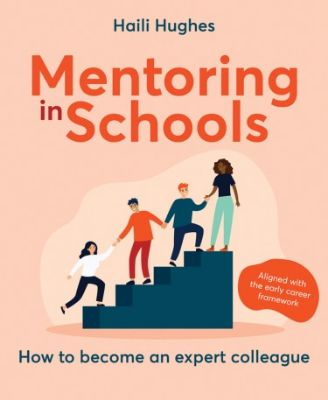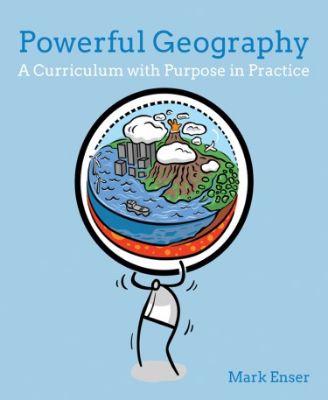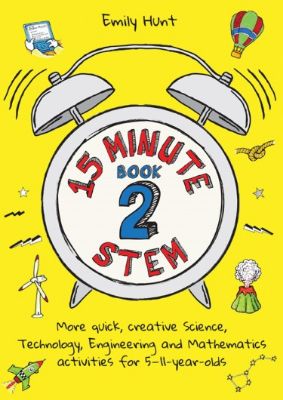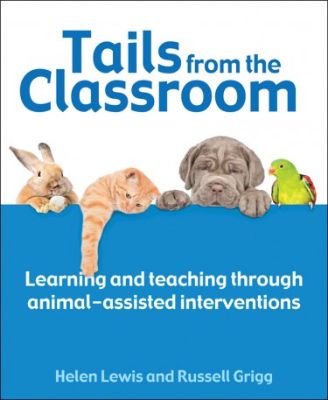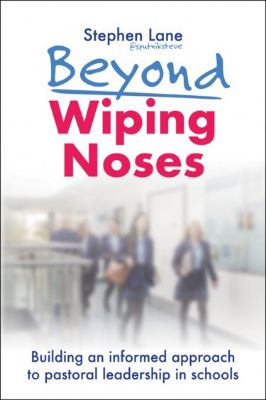Cookies help us deliver our services. By using our services, you agree to our use of cookies.
News
Mentoring in schools: The key to retaining early career teachers?
Monday, 22 February 2021
If you want to support your early career teachers and create an atmosphere of support which will hopefully foster better job satisfaction and retention, please ensure that you have the best possible teachers acting as mentors. These colleagues will be a vital support to new teachers and they will need to be given the time to do this job well and gain the expertise required to be a quality mentor. Read the full post here.
Discover Haili's newly-published book Mentoring in Schools here.
Read more
Discover Haili's newly-published book Mentoring in Schools here.
Powerful Geography has been reviewed!
Thursday, 18 February 2021
This is an excellent book “ that should be read carefully by all ITT, subject leaders, Geographical thinkers and experienced teachers “ as a context and story of our curriculum discipline.
Read the full review here.
Discover Powerful Geography here, which you can get at 30% off using the code SPRING30 until 31st March!
Read more
Read the full review here.
Discover Powerful Geography here, which you can get at 30% off using the code SPRING30 until 31st March!
Emily Hunt has been interviewed for Motherhood Moment
Wednesday, 17 February 2021
STEM (science, technology, engineering and maths) education is a cross-discipline approach to teaching these interrelated subjects, with problem solving at its heart. Great STEM education works through activities with real-world applications, helping children to understand how their learning is relevant and how they could use it in the future. It is an important tool in breaking down stereotypes and encouraging more children to pursue STEM careers.
STEM is therefore an important priority area in modern education, leaving many teachers and parents asking questions such as ˜How do I fit STEM education into my day?™ and ˜What kind of activities should I be exploring?™
Enter Emily Hunt who, in 15-Minute STEM Book 2, has pooled 40 more quick, easy-to-resource activities to reassure teachers and parents that they don™t need to be experts to be able to deliver high-quality STEM education for younger children. Building on the success of her bestselling first book of activities, Emily aims to equip all teachers and parents with the activities and resources they need in order to confidently teach STEM skills.
Read the full article here.
Discover 15-Minute STEM Book 2 here.
Read more
STEM is therefore an important priority area in modern education, leaving many teachers and parents asking questions such as ˜How do I fit STEM education into my day?™ and ˜What kind of activities should I be exploring?™
Enter Emily Hunt who, in 15-Minute STEM Book 2, has pooled 40 more quick, easy-to-resource activities to reassure teachers and parents that they don™t need to be experts to be able to deliver high-quality STEM education for younger children. Building on the success of her bestselling first book of activities, Emily aims to equip all teachers and parents with the activities and resources they need in order to confidently teach STEM skills.
Read the full article here.
Discover 15-Minute STEM Book 2 here.
Pets as Therapy Facebook Live with Helen Lewis and Russell Grigg
Wednesday, 17 February 2021
One of the things that most children around the world have in common is their love of animals.
Psychologists suggest that most children love animals for a combination of reasons. They are attracted by their appearance, noise, movement, visibility and unpredictability, but they also see animals as
˜good listeners™ and comforters.
It™s long been proven that animals are good for adults™ wellbeing, both mental and physical. But in the last few years studies have shown the huge benefit that animals can have on children™s development “ from social, behavioural and emotional development, right through to more nuanced skills in language, literacy and communication.
Dr Helen Lewis and Dr Russell Grigg have been studying the benefits of what they call animal-assisted interventions (AAIs) in educational settings for several years. Helen currently leads an educational anthrozoology module at Swansea University: œRepeated interaction with an animal creates a relationship, which can add to a sense of security and belonging. Children who lack confidence in speaking to humans can address this by gaining confidence in talking to animals.
œWe see this benefit help enormously when it comes to things like reading. Animals can put children at ease and contribute towards an environment in which they are more willing to read, make mistakes, talk about how they feel, read aloud, self-correct and grow in confidence.
Russell adds: œSchemes which feature reading-to-dogs, such as Pets As Therapy™s Read2Dogs, have been shown to motivate and engage reluctant readers and we know that motivation is key to reading for enjoyment. Many young people do not enjoy reading, but one study showed that through ˜playful reading™ to dogs, children develop a more relaxed attitude towards books as they benefit from a close, non-critical and informal relationship. As the dog appears to listen and show interest in the child reading, this increases the child™s confidence and time spent on the reading task.
œRecently we've found lots of schools have used animals to help children return to school after lockdowns, while some have involved animals in online lessons during the pandemic, adds Grigg.
One of the premises behind AAI is that stress is a significant variable in learning and that it can be mediated through interactions with animals. The emphasis is very much on fostering students™ self- management skills, such as learning to handle stress and self-motivation, as well as building self-confidence and positive attitudes. Helen and Russell™s new book Tails from the Classroom explores the use of AAIs in educational settings and how they can inspire and support learners™ all-round development. It also offers schools and teachers a guide to implementing an animal-assisted intervention, including important aspects such as getting parents on board and how best to go about integrating animals into school life.
Helen and Russell will be discussing the science behind animals in the classroom in an exciting Facebook Live event with Pets As Therapy™s Matt Robinson at 19:30 on Monday 22nd February 2021 “ you can watch the live event here. During the event we will also hear from teachers from each corner of the UK who™ve successfully introduced dogs and animals in their schools with the help of Pets As Therapy and its volunteers, exploring what their experience has been and how it™s helped the pupils in their care.
Find out more about Tails from the Classroom here.
Listen to Richard Hill on the Therapycast
Tuesday, 16 February 2021
In episode 3.5 Peter Mabbutt talks to author Richard Hill about the book he wrote with Ernest Rossi - The Practitioner's Guide to Mirroring Hands: A Client-Responsive Therapy That Facilitates Natural Problem-Solving and Mind-Body Healing. They explore Richard's friendship with Ernest Rossi, the Mirroring Hands approach, what makes a good therapy session, along with ultradian rhythms before disappearing down the rabbit hole of Quantum Field theory. Listen to the episode here.
Discover The Practitioner™s Guide To Mirroring Hands here.
Read more
Discover The Practitioner™s Guide To Mirroring Hands here.
Beyond Wiping Noses has been reviewed!
Monday, 15 February 2021
As pastoral staff or leaders, do we spend enough time planning and thinking for the long term?
Have we attempted to develop a ˜curriculum™ for our pastoral work; a curriculum that ties into many aspects of the students™ school life, and not just an assembly or form time in isolation.
Do we spend enough time reflecting upon an evidence base and evaluating different views held about pastoral work? Or do we adhere to our own policies without further thought?
Read this if¦
You are form tutor, Assistant Head of Year, Head of Year or pastoral worker / leader in a school.
You want to consider how research-informed practice can be applied to pastoral work.
Read the full review here.
Discover Beyond Wiping Noses here.
Read more
Have we attempted to develop a ˜curriculum™ for our pastoral work; a curriculum that ties into many aspects of the students™ school life, and not just an assembly or form time in isolation.
Do we spend enough time reflecting upon an evidence base and evaluating different views held about pastoral work? Or do we adhere to our own policies without further thought?
Read this if¦
You are form tutor, Assistant Head of Year, Head of Year or pastoral worker / leader in a school.
You want to consider how research-informed practice can be applied to pastoral work.
Read the full review here.
Discover Beyond Wiping Noses here.

